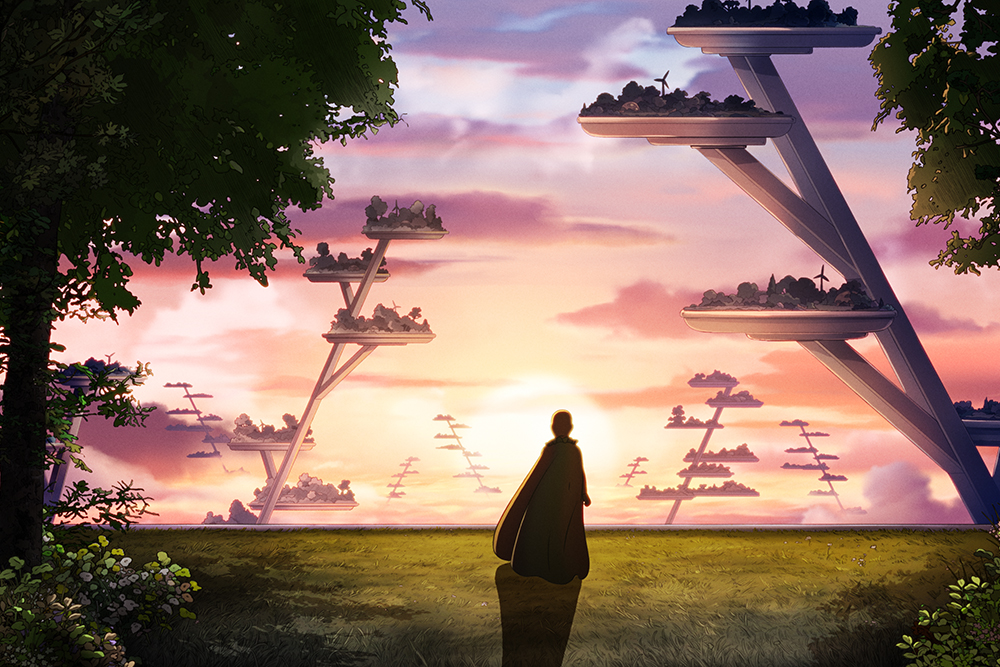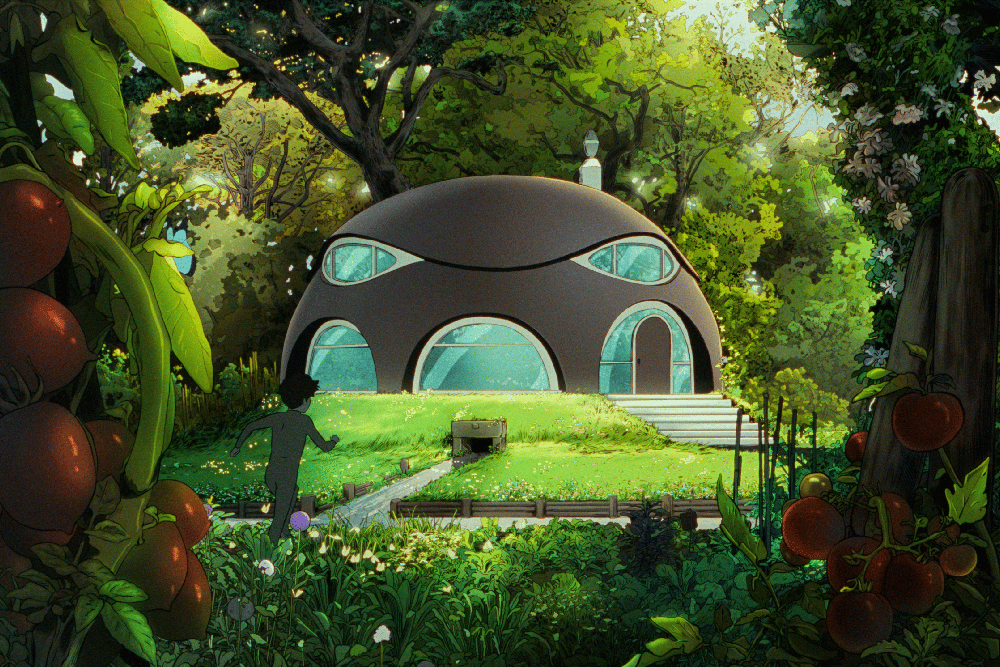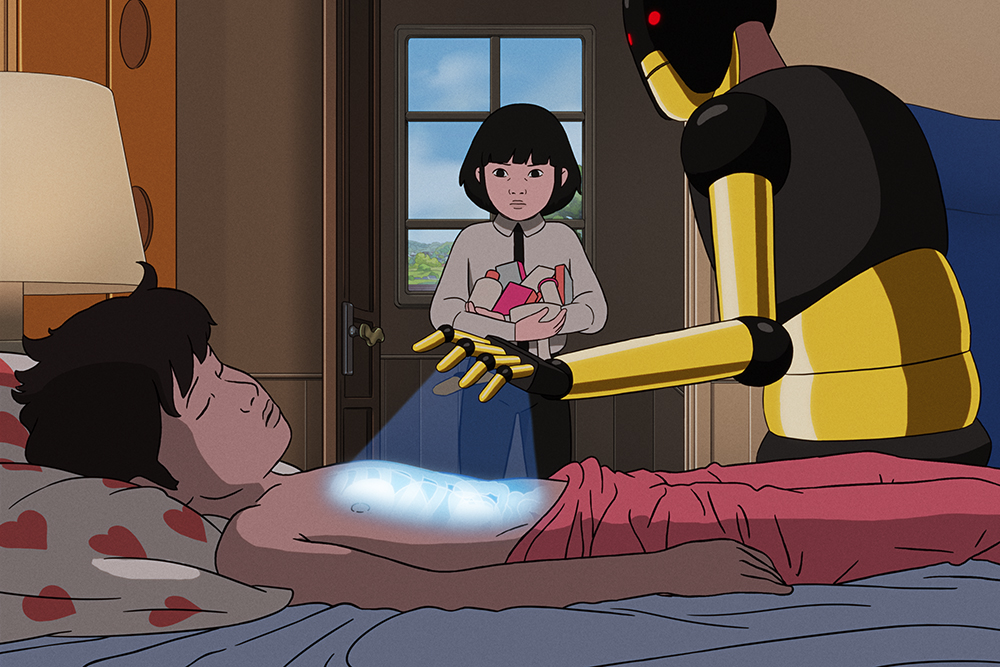Movies - Arco: When French Animation Dreams of the Future and Reawakens the Present
By Mulder, 05 october 2025

Every once in a while, French animation produces a work so luminous it bridges poetry and philosophy, imagination and emotion. Arco, directed by Ugo Bienvenu and co-written with Félix de Givry, is one of those rare miracles. Premiering at the 2025 Cannes Film Festival in the “Special Screenings” section, the film captivated audiences with its beauty and emotional clarity before winning the Cristal for Best Feature at the Annecy International Animation Film Festival. It later received the Audience Award at the 2025 Champs-Élysées Film Festival and the Golden Stork for Best Animated Feature at the Strasbourg European Fantastic Film Festival. More than a movie, Arco is a meditation on transmission, memory, and hope—ideas that have defined Ugo Bienvenu’s artistic universe, from his acclaimed graphic novels to his deeply personal short films.
The story unfolds in 2075. A ten-year-old girl named Iris witnesses a strange boy in a rainbow suit fall from the sky. His name is Arco. He comes from a distant, idyllic future—the year 2932—where time travel exists. Their encounter becomes the heart of a tale that blends adventure, science fiction, and tenderness. Through Iris and Arco’s bond, the film reflects on humanity’s growing detachment from nature and from one another. Iris, a child of a world enclosed in glass domes, lives surrounded by holograms and robots. Arco, on the other hand, comes from a harmonious society where technology and ecology coexist. Their meeting reignites something lost: the human impulse to connect, to learn, and to dream together.

Visually, Arco stands out as a hand-crafted marvel. Ugo Bienvenu and Félix de Givry chose to produce the film entirely in 2D within their Paris-based studio, Remembers—a bold move in an era dominated by digital perfection. Every frame is drawn by hand, breathing warmth and imperfection. The faces, though first modeled in 3D for structure, were all redrawn to break the sterile smoothness of digital rendering. The result is animation that feels alive. Light itself becomes a narrative force: a bridge between times, memories, and worlds. The cave sequence, where the characters are immersed in darkness before discovering ancient drawings, recalls humanity’s earliest acts of art-making—reminders that creation resists time’s erosion.
The rainbow, both symbol and motif, encapsulates the spirit of the film. For Ugo Bienvenu, it’s a “pop element of nature,” something both mystical and accessible. It stands for hope, connection, and beauty after turmoil. Arco, the rainbow child, embodies this idea of unity between science and spirituality, between innocence and awareness. “All great ideas start from a small drawing,” Ugo Bienvenu often says—a phrase that could serve as the film’s manifesto. The story is, in essence, about imagination as the seed of progress.

Through Iris’s eyes, Arco contrasts two visions of Earth: one where technology has overpowered reality, and another where humanity lives in balance with its environment. It’s a fable about choices—how the world we build reflects what we value. The domed houses of Iris’s city, the holographic parents she cannot touch, the synthetic landscapes—all these images question whether progress without presence still counts as progress. Félix de Givry explains that Arco was conceived for a generation that never knew life before smartphones, for whom digital intimacy has replaced real closeness.
The film is a mirror of our era, where artificial light often blinds us to what is truly luminous. Ecology is not merely a backdrop but a vital undercurrent. One of the film’s most striking moments—an immense fire consuming Iris’s world—draws directly from real-world climate disasters. “That’s not tomorrow,” says Ugo Bienvenu, “that’s today.” Yet the film never preaches; it simply invites reflection. Its educational companion guide, written by Jean-Charles Malbec, extends the film’s reach into classrooms, using Arco as a gateway to explore ecosystems, climate change, and environmental responsibility. It’s rare for an animated film to merge art and pedagogy so naturally, turning science into story and awareness into wonder.

Behind the production lies a remarkable partnership. Ugo Bienvenu and Félix de Givry met while working on Mia Hansen-Løve’s Eden and later founded Remembers in 2018. They built Arco the way their heroes at Studio Ghibli once did: independently, collaboratively, and with an almost stubborn belief in beauty. Refusing to outsource production, they animated everything in Paris, foregoing certain regional subsidies in favor of artistic control. Their perseverance caught the attention of Natalie Portman and Sophie Mas, whose company Mountain A joined the project, providing not just funding but faith. This rare independence—working with integrity rather than scale—allowed Arco to keep its soul intact.
With voices from Swann Arlaud, Alma Jodorowsky, Louis Garrel, Vincent Macaigne, and Oxmo Puccino, the film carries a warmth and intelligence that make it resonate far beyond its 82 minutes. It’s both a child’s fable and an adult’s awakening, a luminous reminder that art can teach us to see again. In a time when cinema often confuses noise with emotion, Arco feels like a quiet revolution—a film that whispers rather than shouts, yet leaves the heart trembling. Ugo Bienvenu and Félix de Givry offer more than an animated feature: they give us a vision. Arco is a dream of reconciliation—between nature and progress, between past and future, between adults and children. And perhaps, between what we are and what we still have time to become. Because sometimes, to save the world, all it takes is to believe in a rainbow.

Synopsis :
In 2075, a 10-year-old girl named Iris sees a mysterious boy dressed in a rainbow suit fall from the sky. His name is Arco. He comes from a distant, idyllic future where time travel is possible. Iris takes him in and does everything she can to help him return home.
Arco
Directed by Ugo Bienvenu
Written by Ugo Bienvenu, Félix de Givry
Produced by Ugo Bienvenu, Félix de Givry Sophie Mas, Natalie Portman
Starring Swann Arlaud, Alma Jodorowsky, Margot Ringard Oldra, Oscar Tresanini, Vincent Macaigne, Louis Garrel, William Lebghil, Oxmo Puccino
Cinematography :
Edited by Nathan Jacquard
Music by Arnaud Toulon
Production companies :, Remembers, Mountain A
Distributed by Diaphana Distribution (France), NEON (United States)
Release dates : October 22, 2025 (France), November 14, 2025 (United States)
Running time : 82 minutes
Photos : Copyright Remembers Mountain A

